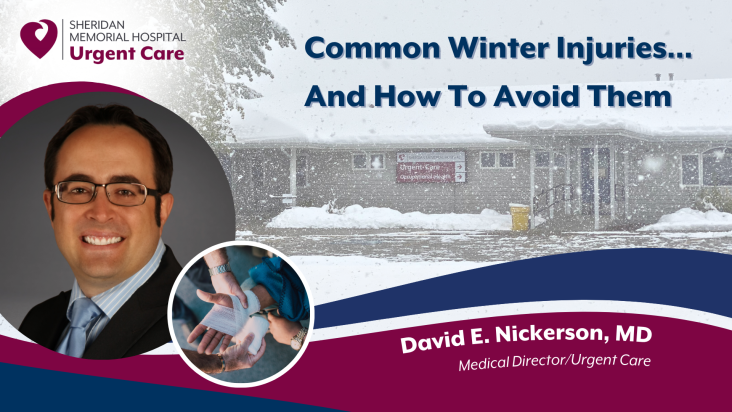By David Nickerson, MD – Medical Director of Sheridan Memorial Hospital’s Urgent Care
While early this month, we all enjoyed the cooler temperatures of fall without all of the snow and ice, as Wyomingites we know the elements will be upon us soon.
With wintry weather comes an increased opportunity for injury. While some slips and falls may seem inevitable, there are ways to decrease your chances of falling and limit injury if you do catch that perfect patch of ice and lose your balance.
Wear proper footwear. While this bit of advice can help avoid injury throughout the year, in the winter months it becomes even more critical. Choose shoes with chunky treads or utilize removable traction footwear like Yaktrax or ice cleats.
Take small steps. Think like a penguin. You may feel silly, but when walking on packed ice or snow, small, shuffling steps can increase your balance and therefore decrease the risk of falling.
Keep your hands free. While we all want to make as few trips as possible to carry those groceries indoors, having your hands full of bulky or heavy items can both decrease your ability to balance and keep you from breaking your fall if you do slip. If you do fall and try to catch yourself, be sure to keep your knees and elbows bent to avoid any additional injuries from bracing your fall.
Be aware of your physical limitations. While those 6 inches of snow look pretty and fluffy from the comfort of your living room, it can wreak havoc on backs, shoulders and other muscles when on the end of a shovel. Take breaks and try to push the snow as much as you can rather than lift it.
Wear the proper gear. Whether protecting fingers from frigid temperatures with gloves or wearing a helmet to guard your face and head from a fall while skiing, make sure you have the proper gear no matter what the outdoor activity.
Be aware of problem areas. Large parking lots with high traffic, areas near gutters, and inclined pavement or sidewalks are often surprisingly icy and are some of the most common locations of falls requiring medical attention.
Not all winter injuries are avoidable. After all, we never know what Mother Nature will throw at us. If you do sustain a winter-related injury, the degree of injury may determine where you seek medical treatment.
For example, if you suspect a broken bone or are in serious pain 24-48 hours after a fall, seek medical attention at an urgent care facility. Other common, minor injuries urgent care providers can diagnose and treat include sprains, scrapes and cuts that need stitches. If you’ve bumped your head, urgent care facilities can also evaluate for concussions.
For more severe injuries – for example if you are experiencing chest pain, trouble breathing, trouble speaking or understanding speech, severe bleeding or loss of consciousness – head straight to the emergency department for treatment.
While winter in the Mountain West offers plenty of opportunity for outdoor recreation, basic precautions can help you avoid some of the most common seasonal injuries.
To learn more about the hospital’s Urgent Care Clinic and Dr. Nickerson see: Urgent Care – Sheridan Memorial Hospital (sheridanhospital.org)

